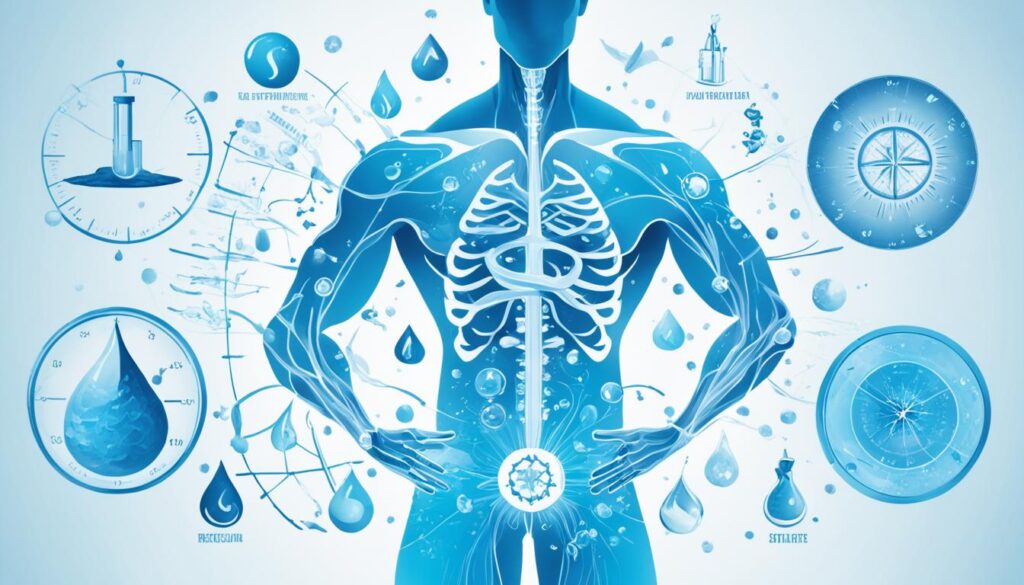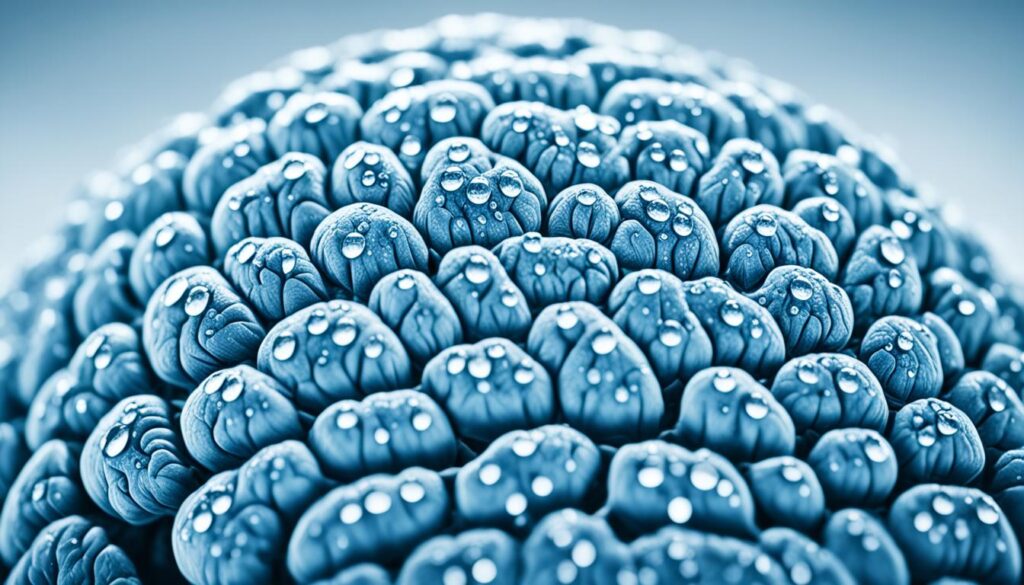The water diet plan is gaining attention in the health community. Recent studies, like one in Nature Metabolism, explore if it’s effective for weight loss. Over a week, researchers looked at how just drinking water affected people. They found positive changes in body protein and organ work.
Many wonder if the water diet does more than cut weight. A study found health perks begin three days into this diet plan, including lasting fat loss. However, experts warn it’s not for everyone, especially if you have health issues.
Key Takeaways
- Research in Nature Metabolism showcases substantial weight loss with the water diet plan.
- The water diet can lead to changes in protein levels, potentially enhancing organ efficiency.
- A sustained reduction in fat mass was observed post fasting, supporting the water diet for weight loss goals.
- The health benefits of fasting appear to manifest after three days of calorie restriction.
- Fasting is advised to be approached with caution, particularly for those with certain health conditions.
Exploring the Recent Breakthroughs in Water Fasting Research
Recent studies have revealed amazing water fasting benefits. They show not just weight loss but deep changes in our bodies. These discoveries help us see water fasting in a new light, beyond just eating less.

The Impacts of a Seven-Day Water Fast on the Body
Research from Queen Mary University of London shows a seven-day water fast can lead to losing 12.5 pounds. This includes both fat and lean mass. It shows our bodies switch to using fat for energy. Such findings match what many people say about water fasting.
Understanding the Molecular Changes During Fasting
Studies found changes in brain proteins, suggesting better brain function and health. This supports the idea that water fasting improves how our organs work.
Highlighting the Non-Weight Loss Benefits of Water Fasting
Healthline, a reliable health source, talks about water fasting’s role in cleaning cells and lowering blood pressure. It suggests fasting might slow aging and prevent diseases like Alzheimer’s. This offers hope for staying healthy longer.
| Health Aspect | Improvement Noted | Potential Risk |
|---|---|---|
| Weight Management | Average 12.5-pound loss | Muscle mass reduction |
| Cellular Function | Induction of autophagy | Requires further research |
| Neurological Health | Protein shifts in brain neurons | Varies per individual health status |
| Cardiovascular Health | Lower blood pressure | Can exacerbate certain conditions |
The Realities of Water Diet Weight Loss
Many people are unsure about trying the water diet weight loss plan. But stories like Emma Roberts’, a nutrition health coach, show us the real benefits. She tried a five-day water fast not to lose weight but to help her body heal itself. Her aim was to repair muscle tissue and boost cell renewal.
Roberts found more than just physical benefits from her fast. She felt her mind became clearer, like a fog had lifted. Her digestion also improved greatly, which is a key but often overlooked advantage of water fasting. After her fast, she didn’t go back to eating normally right away. She started with bone broth and then slowly added more solid foods, keeping the benefits she’d gained.
These stories show us the possible pros of water fasting, like fat loss and better focus. But, results can vary from person to person. It’s important to talk to a doctor before starting a water fast. This helps make sure it’s safe and right for you.
To sum up, water fasting can be a useful part of a health plan. It offers not just water diet weight loss but also other health perks, like cell renewal and sharper mental function. However, it’s best followed with expert advice to truly reap its benefits.
Water Diet Does it Work for Overall Health?
New studies show the water diet might help our brains, not just our weight. While many talk about losing pounds, it’s important to see how it affects our brain’s health.
Neurological Advancements from Protein Level Changes
Water fasting might boost brain health by changing protein levels. This could help explain why it’s been used for neurological issues before. It offers a new view on its health impacts.

Potential Risks and When to Avoid Water Fasting
However, water fasting has its downsides. It can be risky for some, leading to dehydration and muscle loss. Doctors often warn people with certain health issues to avoid it. It’s crucial to know your health risks first.
Comparing Intermittent Fasting and Pure Water Diets
Intermittent fasting and water diets differ greatly. They each have their own eating and fasting rules. It’s essential to carefully weigh their pros and cons. This helps match them to personal health goals and doctor’s advice.
Water Fasting Results: Beyond the Scale
Many people start water fasting to lose weight. But its effects go much deeper than just the scale numbers going down. It’s not just about losing weight. Water fasting brings important changes inside your body. One key change is cellular cleaning through autophagy. This process gets rid of old cells, making room for new, healthy ones.
After fasting for 72 hours, your body starts regenerating stem cells. This is one of the many benefits of water fasting. Other rewards include a boost in stem cell regeneration. This is especially noticeable after fasting for three days straight.
Water fasting impacts your mind and spirit too. People often notice they think more clearly and feel better overall. They may even feel happier and more alert. It’s clear the benefits of water fasting reach beyond just losing weight. They open up a chance for deeper health and awareness gains.
Top science journals and research have dug into fasting’s effects. They’ve uncovered the complex changes that happen in your body during a fast. Your body switches to using fat for energy in a state called ketosis. This releases molecules that not only power your body but also boost your health. This research shows how a water fast can improve your overall health and energy.




